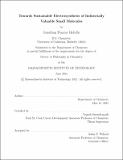Towards Sustainable Electrosynthesis of Industrially Valuable Small Molecules
Author(s)
Melville, Jonathan Francis
DownloadThesis PDF (36.20Mb)
Advisor
Surendranath, Yogesh
Terms of use
Metadata
Show full item recordAbstract
The decarbonization of legacy industrial processes calls for substantial advances in our ability to apply sustainably generated electricity as a means of making and breaking arbitrary chemical bonds. The development of such carbon-neutral systems demands the design of efficient and selective electrocatalysts with an eye towards economic viability and industrial operability. In this work, we present three electrochemical processes at varying degrees of practical maturity with theoretical applicability to a zero-carbon future economy:
In Chapter 2, we rigorously interrogate the electrolysis of molten condensed phosphate salts to white phosphorus, a valuable specialty chemical currently generated by energy-intensive carbothermal reduction. We demonstrate that the reduction of phosphate to phosphorus occurs near the limit of energetic and atom efficiency, portending future application as a milder and possibly carbon-neutral route for industrial phosphorus synthesis.
In Chapter 3, we investigate the electrochemical reduction of nitrogen to ammonia,
whose current production is dependent on the reforming of methane. We examine the fundamental challenges intrinsic to this challenging reactivity, and highlight the amplification of catalyst selectivity at elevated pressures, a strategy which is showcased on a novel copper nitride electrode with exceptional selectivity towards nitrogen reduction in aqueous media.
In Chapter 4, we discuss electrochemical methane monofunctionalization as a strategy for gas-to-liquid conversion, capable of valorizing methane flare streams economically inaccessible by incumbent industrial chemistries. We devise a process scheme for methane gas-to-liquid electroconversion with capacity for real-world implementation, which maximizes overall carbon efficiency by minimizing distillative overheads.
The development of sustainable processes for generation of energy-dense fuels or valuable refined chemicals is ultimately reliant upon the application of efficient electrocatalysts for selectively employing electrons to rearrange chemical bonds. With this work, we demonstrate the rich potential for electrochemistry to unlock future routes to desirable industrial reactivities.
Date issued
2021-06Department
Massachusetts Institute of Technology. Department of ChemistryPublisher
Massachusetts Institute of Technology